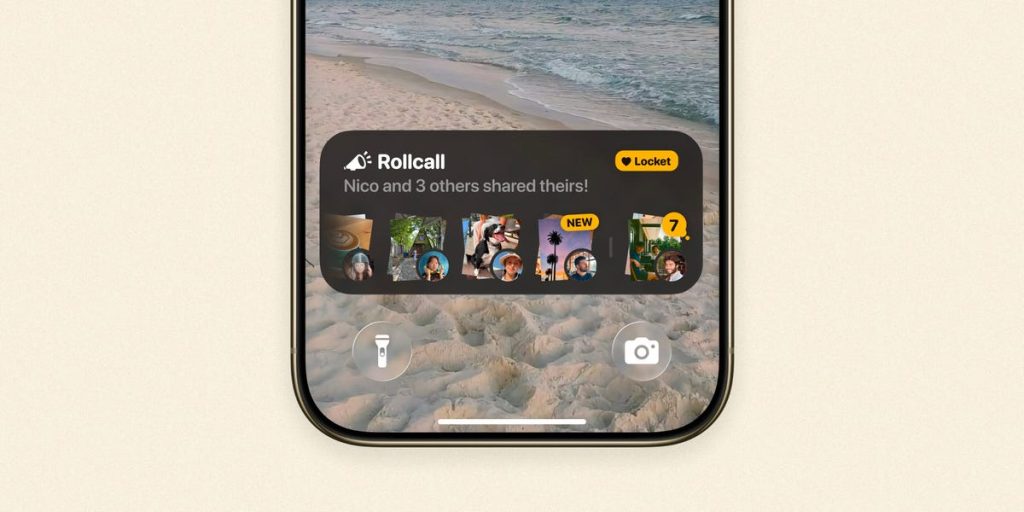An upstart social media platform is coming for the Instagram “photo dump.”
Locket first captured the attention of Gen Z users in 2022 as an alternative to platforms like Instagram and Snapchat. It pitches a more private experience with a widget that brings your closest friends’ photos directly to your smartphone.
The social startup is launching a new feature called Rollcall, where users can upload a collection of photos from the week every Sunday. The photos are only viewable for seven days.
“When you think about some of these bigger platforms … maybe you see a friend’s photo dump every once in a while, but that’s surrounded by so much content from creators, from anybody else on the platform,” Locket CEO Matt Moss told Business Insider.
Locket
The feature has been testing in the US for about six months, Moss said, and is rolling out widely for iOS users next week. The feature will be available to Android users later this year.
Rollcall’s biggest fans, so far? Gen Alpha.
Moss said about 80% of the Locket users who have been posting photo dumps every week are Gen Alpha (which Locket defines as between 13 and 17, including some Gen Z cuspers). The age group accounts for 49% of the app’s US users. Locket has about 9 million global daily active users, per the company, and over 90 million downloads since launch.
Social media with Gen Alpha in mind
The bulk of Locket’s overall user base is under 25 years old, Moss said.
Related stories
While Gen Z users initially propelled the app’s growth, the startup sees the next generation of teens as its primary audience. The platform has seen a 60% increase in US-based Gen Alpha users in the last year, Moss said. (Users must be at least 13 years old to use Locket.)
This subset of teen users has a stronger retention rate than other cohorts on the app, Moss said,
Locket’s “simplicity” and focus on friend-to-friend sharing are the biggest draws for younger users, he added.
Courtesy of Locket
“A lot of it comes down to wanting ways to actually genuinely connect with friends,” Moss said. “Although there are a lot of platforms that started off with that as a core focus, when you open most of those apps these days, connecting with friends is kind of lost on the list of the things that you can actually do in those apps.”
Moss didn’t name any apps specifically, but it’s no secret that platforms like Instagram, Facebook, and TikTok have become more entertainment platforms than social ones.
On average, US-based users have about 12 friends on Locket.
The rise — or return — of private social networks
Locket is part of a set of new social media apps that have launched, in part, as a reaction against the Big Tech social platforms.
For instance, Lapse, a disposable camera-style social media app, launched in 2021 and touts the tagline Friends not Followers. There’s also Retro, a photo-sharing app where people share weekly recaps (similar to Locket’s Rollcall), which launched in 2023.
Some startups in this category are getting backed by venture capitalists on the hunt for the next social media breakthrough. Locket raised a $12.5 million seed round in 2022 led by OpenAI’s Sam Altman, with participation from Sugar Capital and Instagram cofounder Mike Krieger.
Locket hasn’t raised capital since, Moss said, citing the startup’s profitability.
Its subscription, Locket Gold, accounts for 50% of the company’s revenue and costs users about $4 a month to unlock features like unlimited friends, no ads, and longer videos. Appfigures Intelligence estimates that Locket’s gross consumer spending on the app (in-app purchases) has exceeded $7.6 million to date and has increased year-over-year by 48.7%. Advertising accounts for the other 50% of Locket’s revenue, the company said. Other private social networks, like Retro, have also leaned into freemium models.
Moss said that monetizing early and keeping a small team — it has 14 employees — has allowed the company to scale while staying lean.
But any social media platform’s popularity can be fleeting. An app that was once at the top of the charts can become a distant memory in a matter of months. Moss said that testing new products, like Rollcall, is a way to extend the app’s offerings while still keeping it simple enough not to overwhelm users, ultimately retaining loyal users.
“If you want to be the best app for friends and family, you also need to provide a lot of different value for people,” Moss said. “It can’t just be one feature. It’s figuring out all the different ways you might want to stay close with the people you care about.”


